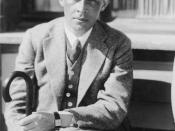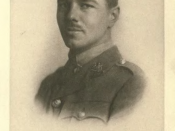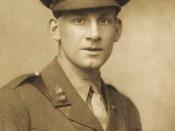What better way to serve your country than with enthusiastic noble patriotism, to fight for honour and prestige to protect your nation. Only to find out with the sacrifice of your life that such a romantic ideal is an illusion. The illusions of heroic, noble and enthusiastic notions that people believed of war were destroyed quickly by reality and were demonstrated in literature of front line veterans like Remarque, Sassoon and Owen. The mass society welcomed the notion of war. Their expectation of war found it a) glamorous with the illusion that it was the ultimate selfless act to show one's bravery and ennoblement that Remarque destructs with his description of trench warfare, b) war offered communitarism aspects of society that banded men as brothers in a like cause that Sasson shows as an illusion that implies how real class lines still existed in war with his poem that displays his discontent for senior officers, c) the preference of war over peace by civilian society did not last for the duration of the war but rather showed their naivety when a rift had formed between them and the soldiers when they returned as remnants of men that Owen portrays in his poem about the misery of war.
With no surviving veterans of the last war, propaganda sensationalized the ideals of combat that it would make clean-cut men brave, noble and heroic. At the beginning of the Great War it was expected to be over in a matter of weeks with no real violent repercussions. The enthusiasm of young men to join in the ranks of combat would make them stronger and better men, was an illusion that Remarque describes from his own front line experience. From the perspective of a young German soldier, Remarque writes, "we have become wild...



Interesting point of view
A lot of run-on sentences. The topic is catchy and the essay is very interesting as well.
8 out of 8 people found this comment useful.